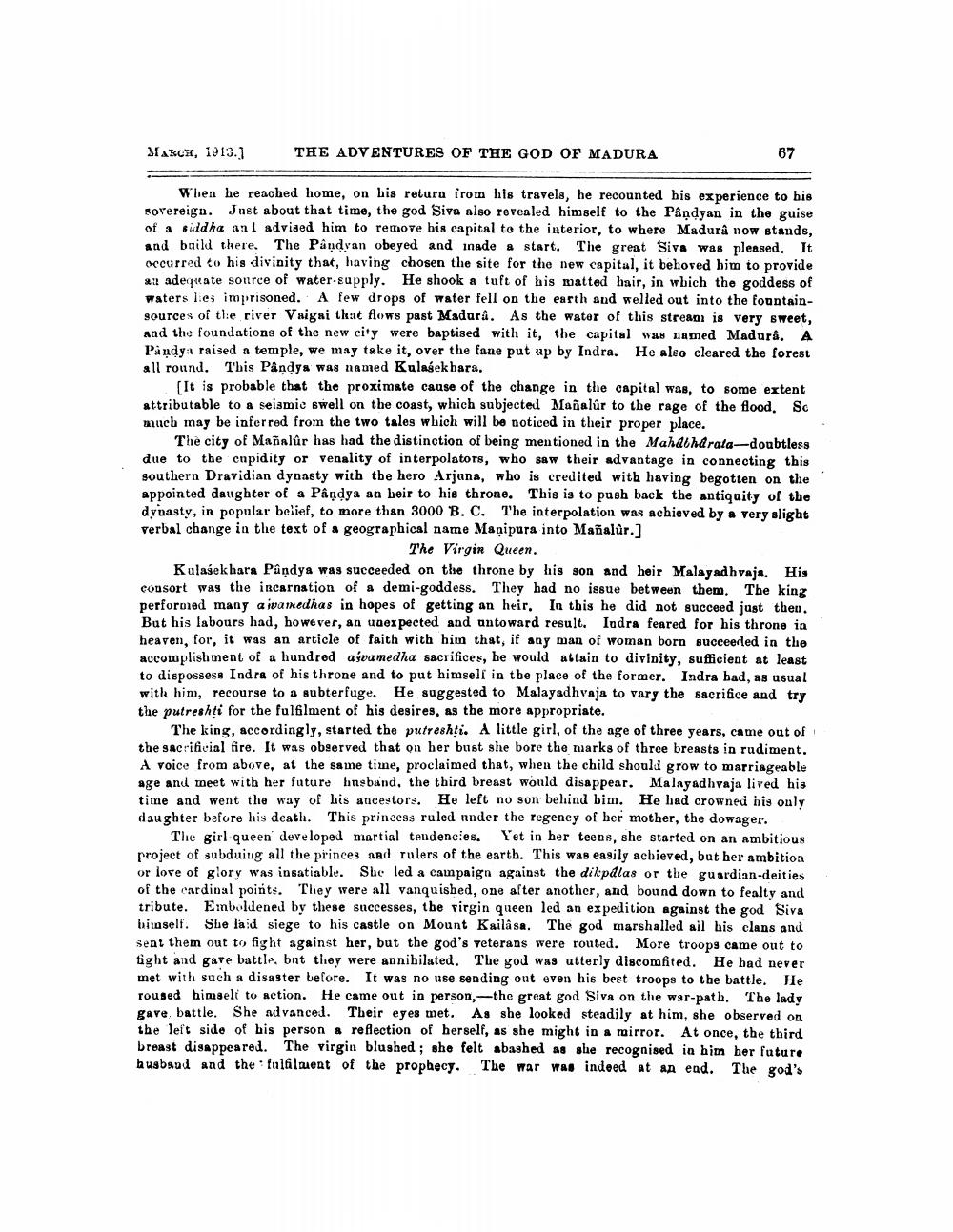________________
MARCH, 1913.]
When he reached home, on his return from his travels, he recounted his experience to his sovereign. Just about that time, the god Siva also revealed himself to the Pândyan in the guise of a siddha ani advised him to remove his capital to the interior, to where Madurâ now stands, and build there. The Pândyan obeyed and inade a start. The great Siva was pleased. It occurred to his divinity that, having chosen the site for the new capital, it behoved him to provide an adequate source of water-supply. He shook a tuft of his matted hair, in which the goddess of waters lies imprisoned. A few drops of water fell on the earth and welled out into the fountainsources of the river Vaigai that flows past Madura. As the water of this stream is very sweet, and the foundations of the new city were baptised with it, the capital was named Madura. A Pandya raised a temple, we may take it, over the fane put up by Indra. He also cleared the forest all round. This Pandya was named Kulasekhara.
THE ADVENTURES OF THE GOD OF MADURA
67
[It is probable that the proximate cause of the change in the capital was, to some extent attributable to a seismic swell on the coast, which subjected Mañalûr to the rage of the flood. Sc much may be inferred from the two tales which will be noticed in their proper place.
The city of Mañalûr has had the distinction of being mentioned in the Mahabharata-doubtless due to the cupidity or venality of interpolators, who saw their advantage in connecting this southern Dravidian dynasty with the hero Arjuna, who is credited with having begotten on the appointed daughter of a Pândya an heir to his throne. This is to push back the antiquity of the dynasty, in popular belief, to more than 3000 B. C. The interpolation was achieved by a very slight verbal change in the text of a geographical name Manipura into Mañalûr.]
The Virgin Queen.
Kulasekhara Pandya was succeeded on the throne by his son and heir Malayadhvaja. His consort was the incarnation of a demi-goddess. They had no issue between them. The king performed many aivamedhas in hopes of getting an heir. In this he did not succeed just then. But his labours had, however, an unexpected and untoward result. Indra feared for his throne in heaven, for, it was an article of faith with him that, if any man of woman born succeeded in the accomplishment of a hundred aśvamedha sacrifices, he would attain to divinity, sufficient at least to dispossess Indra of his throne and to put himself in the place of the former. Indra bad, as usual with him, recourse to a subterfuge. He suggested to Malayadhvaja to vary the sacrifice and try the putreshti for the fulfilment of his desires, as the more appropriate.
The king, accordingly, started the putreshți. A little girl, of the age of three years, came out of the sacrificial fire. It was observed that on her bust she bore the marks of three breasts in rudiment. A voice from above, at the same time, proclaimed that, when the child should grow to marriageable age and meet with her future husband, the third breast would disappear. Malayadhvaja lived his time and went the way of his ancestors. He left no son behind bim. He had crowned his only daughter before his death. This princess ruled under the regency of her mother, the dowager.
The girl-queen developed martial tendencies. Yet in her teens, she started on an ambitious project of subduing all the princes and rulers of the earth. This was easily achieved, but her ambition or love of glory was insatiable. She led a campaign against the dikpdlas or the guardian-deities of the cardinal points. They were all vanquished, one after another, and bound down to fealty and tribute. Emboldened by these successes, the virgin queen led an expedition against the god Siva himself. She laid siege to his castle on Mount Kailasa. The god marshalled ail his clans and sent them out to fight against her, but the god's veterans were routed. More troops came out to tight and gave battle, but they were annihilated. The god was utterly discomfited. He had never met with such a disaster before. It was no use sending out even his best troops to the battle. He roused himself to action. He came out in person,-the great god Siva on the war-path. The lady gave, battle. She advanced. Their eyes met. As she looked steadily at him, she observed on the left side of his person a reflection of herself, as she might in a mirror. At once, the third breast disappeared. The virgin blushed; she felt abashed as she recognised in him her future husband and the fulfilment of the prophecy. The war was indeed at an end. The god's




